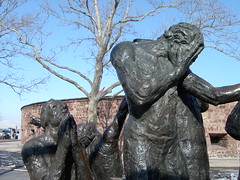I have heard this statement from Mosiah 4:27 applied to many things:
And see that all these things are done in wisdom and order; for it is not requisite that a man should run faster than he has strength.
Somehow in all the repetitions, in my mind the statement had become divorced from the context in which it was given. I don’t mean to suggest that it was not applicable in all the places I have heard it applied, but I learned a lot about the proper disposition of material goods (the context it was given in) when I avoided generalizing the counsel.
The statement was made at the end of king Benjamin encouraging his people to give of their goods to those who sought their help if they were able. His statement was to remind those who might be overly generous, to not bring themselves to a beggars status in their efforts to help the beggars. Making that connection was not a major revelation to me, but combined with much of the best financial advice I have come across I came up with a comprehensive approach to the best way to allocate your money to be generous with others while not running faster than I have financial strength.
There are 5 avenues to dispense with material goods. In the proper order they are:
- Tithing
- Sustenance
- Savings
- Philanthropy
- Luxury
Having the order is one thing, but knowing how and when to allocate your means to each avenue is the tricky part.
First, pay tithing on whatever means you have. With what remains, provide for your own sustenance, in other words, the necessities of life for yourself and your family.
Second, once you have more means than are necessary for your bare necessities you should allocate some means to savings so as to be able to weather the financial storms that life will bring your way.
Third, when your means are sufficient for you to be able to put some money into savings on a regular basis you should start some form of philanthropy even if you are not able to save as much as you would wish to save. (I use the term philanthropy so as to avoid confusion with some of the meanings of the word “charity.”) As your means increase, you should increase your allocations to both savings and philanthropy in a balanced way (that may not be a 50/50 split, but it should not be giving a pittance to philanthropy while saving large amounts of money).
Fourth, once your savings has increased to the level you feel comfortable with for your future needs you may feel free to allocate excess resources towards some luxuries. (Of course by this time your sustenance should be exceeding a cardboard box for shelter and a diet that is limited to rice and Cup ‘o Noodles®.) As your means continue to increase you should increase your philanthropy at least as much as you increase your luxury (and you might want to increase your savings as well).
Finally, if your material means begin to exceed the level required for luxuries enough to make your live materially easy (meaning that more luxuries would not bring more fulfillment in your life) then you should allocate virtually all increases in your resources toward philanthropy.

